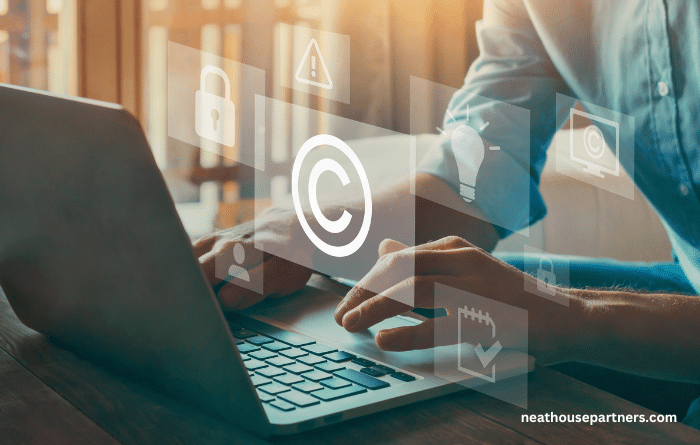Much like you’d ensure the security of your company’s physical assets, safeguarding your Intellectual Property (IP) is also incredibly important.
Whether it’s your branding, inventions, designs, or other creative elements, it’s crucial to shield them.
Key reasons to protect IP include:
- Maintaining your competitive edge.
- Guarding against unauthorised use or imitation.
- Encouraging creativity and innovation within your organisation.
What Is Intellectual Property
Intellectual Property (IP), covers inventions, literary and artistic works, designs, symbols, names, and images used in business.
It’s an umbrella term for a collection of rights that give creators and owners legal protection against unauthorised use of their creations.
From an HR perspective, IP also incorporates lists of clients, unique information, software coding, and other assets that employees produce or evolve during their tenure with your business.
IP can be categorised into:
- Trademarks: Signifies your brand, logo, or slogan.
- Patents: Protects your inventions.
- Copyrights: Covers literary, artistic, and musical creations. Copyright grants the creators of these works the exclusive rights to reproduce, distribute, and display their creations.
- Designs: Shields the visual appearance or aesthetics of a product.
- Trade Secrets: protect confidential business information that provides a company with a competitive edge.
Each type of IP serves different sectors, with each having its own set of rules and protection durations and it’s essential to note that IP rights are territorial, which means that these rights are limited to the country or region where protection is granted.
As such, intellectual property must typically be protected in each country where protection is sought.
Why Employers Must Prioritise IP Protection
Protects business reputation and brand value: Your IP sets you apart, making it vital to shield it from misuse.
- IP, be it in the form of logos, proprietary technology, or unique business processes, is the backbone of your brand’s identity. Any dilution or unauthorised replication can tarnish your brand’s reputation and diminish its perceived value in the market.
- When customers choose your product or service, they’re buying into the promise that your brand represents. Ensuring that this promise remains undiluted by protecting your IP solidifies their trust and ensures lasting loyalty.
Financial implications: From potential revenue via licensing to franchising, your IP is an untapped goldmine.
- Revenue Streams: Your IP can become a significant source of revenue. From licensing deals to franchising opportunities, these assets can be monetised in myriad ways, driving additional income for the business.
- Investment Attraction: Investors often look for businesses that have protected IPs. It not only indicates innovation but also showcases the company’s foresight and commitment to safeguarding its unique assets, making the business a more appealing investment opportunity.
Deters competitors: Your IP protection sends a clear message – unauthorised copying or imitation won’t be tolerated.
- Setting Boundaries: By protecting your IP, you’re drawing a clear line in the sand, signalling to competitors that any attempt to copy or imitate will be met with legal consequences.
- Encouraging Internal Innovation: Knowing that their innovations will be protected, employees are more likely to drive forward-thinking solutions and ideas, keeping the business at the forefront of industry advancements.
The High Cost of Ignoring IP Rights
Loss of exclusive rights: Your business stands to lose revenue and market share.
- Market Impact: Overlooking IP protection can lead to competitors encroaching on your territory, resulting in potential revenue losses and diminishing market share.
Innovation at Risk: Without IP safeguards, your unique business innovations become vulnerable to imitation, diluting their value.
Damage to brand reputation: Your credibility takes a hit when imitated.
- Trust Erosion: When others imitate your brand, it muddies the waters for consumers. As a result, your brand’s trustworthiness and the loyalty it has cultivated could wane.
- Reputation Recovery: Rebuilding a brand’s image post-damage can be time-consuming, expensive, and in some cases, near-impossible.
Potential legal penalties: Overlooking IP rights could lead to costly legal battles.
- Financial Setbacks: Ignoring IP rights can culminate in drawn-out legal disputes, which are not only a financial drain but can also divert crucial resources from business growth.
- Strategic Disruptions: Being embroiled in legal battles can disrupt long-term business strategies and tarnish relationships with stakeholders and partners.
How Is IP Governed?
In the UK, IP rights are governed by the Intellectual Property Act 2014.
The UK Intellectual Property Office oversees registrations and grievances.
Abiding by these regulations not only ensures legal compliance but also offers benefits like legal recourses in cases of infringements.
While it largely depends on the IP type, trademarks, for instance, last 10 years but can be renewed indefinitely. Patents, on the other hand, generally last for 20 years.
Navigating Dual Protection: A Strategy for Businesses Post-Brexit
For businesses operating both in the UK and the EU, you should follow the steps below to ensure protection post-Brexit.
- Conduct an IP Audit: Start by assessing your existing IP portfolio. Determine which intellectual properties are relevant to your EU operations.
- Separate Registrations: While previously a single IP registration might have sufficed for the whole of Europe, this is no longer the case. If your business is active or plans to be active in the EU, ensure you register your IP rights separately in the relevant EU jurisdictions.
- Seek Expertise: Engage IP lawyers familiar with both UK and EU regulations. They can provide guidance tailored to your industry and business model, ensuring you don’t overlook critical details.
- Review Contracts and Agreements: Revisit any existing licensing agreements, partnerships, or supplier contracts that touch on IP rights. Some might need updates or amendments to reflect the changes brought about by Brexit.
- Stay Informed on Transition Provisions: Some IP rights, like pending trademark applications, were subject to specific transition measures post-Brexit. Ensure you’re aware of any such provisions that might apply to your assets.
- Maintain Vigilance: The post-Brexit IP landscape may continue to evolve as the UK and EU refine their legal and trade relationships. Regularly review updates, court rulings, or changes in legislation that could impact your IP strategy.
HR’s Role in Safeguarding Intellectual Property
HR departments stand at the forefront of ensuring IP protection within the workplace and your team can shape IP protection from the start of every employee’s journey with your company.
From the interview, through to contracts and ongoing training and development, here are 6 effective ways that HR can aid IP protection in business:
- Non-disclosure Agreements (NDAs): These legal tools bind employees to maintain the confidentiality of sensitive information. NDAs serve as shields for vital assets like trade secrets and exclusive client databases.
- Non-compete Agreements (NCAs): By signing an NCA, employees agree not to join rival firms for a defined duration post their current employment. This ensures the safety of unique business knowledge, fostering client loyalty and safeguarding your competitive edge.
- Tailored Employment Contracts: Contracts can be designed to incorporate clauses safeguarding IP. They can specify rights over innovations created or worked upon during an employee’s tenure and can limit the personal use of company assets.
- Comprehensive IP Protocols: Establishing company-specific IP guidelines can clarify rights and set expectations on how employees should manage proprietary data. This can also define reporting mechanisms for IP breaches and the consequent repercussions.
- Ongoing IP Awareness Initiatives: By regularly training employees about the significance of IP safeguards, businesses can instil a culture of awareness and vigilance against potential infringements.
- Oversight and Accountability Measures: Instituting regular checks, like audits, coupled with a robust investigatory process, fortifies compliance with established IP norms.
With well-defined HR strategies, businesses can set a clear roadmap for employees regarding IP expectations.
By engaging these strategies at every phase of an employee’s journey with the company, you stand a better chance of avoiding IP breaches and infringements.
Next Steps
Our team of experts can guide you through best practices to protect your intellectual property and help to ensure that you’re protected from potential infringements.
To delve deeper into how Neathouse Partners can bolster your IP-related solutions and broader HR support, please connect with our expert team at 01244 893776 for tailored advice.





